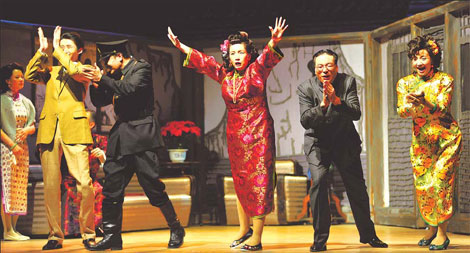Art
Staging a search
Updated: 2011-05-31 07:40
By Shi Yingying (China Daily)
|
Drama Si Shi Tong Tang (Four Generations under One Roof) is staged at Shenzhen's Poly Theater. Provided to China Daily |
The country's original musicals and movies will make money only when a strong network of theaters and cinemas for their distribution is in place, a cultural industry pioneer says. Shi Yingying reports.
When Dark October met Avatar in January, 2010, it was a disaster, admits Jiang Yingchun, general manager of Poly Culture Group Corporation Ltd. The company's subsidiary, Poly Film Investment Co Ltd, invested 150 million yuan ($23 million) in the Chinese film.
"Avatar split audience, a huge portion of it," Jiang told China Daily at the recent 7th China Shenzhen International Cultural Industries Fair.
"If a cinema had nine auditoriums, all of them would screen Avatar. There was no space left for any other film. The situation was even worse in 3D cinemas."
With Chinese audiences flocking to James Cameron's sci-fi extravaganza, one thing became clear to Jiang: "We have to build our own cinema chain to show our work. Our film industry needs more channels so that we can distribute our own movies - whether it is Dark October or some made-in-China cult movie."
Elliot Tong, a Hong Kong-based film producer who spent 15 years in the United States, agrees. Tong says the reason the whole world watches US films is that the country has its own global distribution system.
"China will get a foothold in this slippery business (only) if it develops its distribution network," he says.
Poly has taken the first step. By the end of 2010, Poly Film Investment Co Ltd had five cinemas in Beijing, Guangzhou and Shenzhen and franchised 44 others across the nation.
"But there are far from enough," Jiang says, putting the figure in the context of the nationwide total of more than 37,700 cinemas. "We plan to own more than 30 cinemas and franchise at least 70 in the country in the next three years."
With 11 years of experience in the business, Poly has the biggest theater chain in China. In 2010 alone, almost 3,000 musical shows and stage plays were staged in the Poly Theaters.
"We're the first State-owned enterprise to regard culture as an industry," Jiang says.
"But to be honest, it took us more than 10 years to break even."
It's never easy for a theater business - private or State-owned - to make money, Zhu Guang, a Shanghai-based theater critic, says.
She says this is one of the reasons a show usually needs many sponsors.
"One just can't afford it, because it costs more than 20,000 yuan to do a show in a small-scale theater in such cities as Shanghai and Beijing," Zhu says.
Even in Shenzhen, two-thirds of seats in Shenzhen Grand Theater have gone vacant in the past three years, as had half the seats in Shenzhen Concert Hall from 2008 to 2009. The local government subsidized them to the tune of almost 64 million yuan between 2007 and 2010.
"For Poly, the most efficient way to cut back costs is to develop the theater chain into a network and to build the Poly brand as the country's mainstream theater," Jiang says.
He adds that it is important to allocate theaters based on local needs because "people from different regions have their preferences".
"Fans of Huju Opera won't go for Shandong clapper ballad, for example. Our major theaters are now scattered in the Bohai Sea region, Yangtze River Delta and Pearl River Delta," he says.
"It's much easier for us to organize shows this way."

Specials

Birthday a new 'starting point'
China's national English language newspaper aims for a top-notch international all-media group.

Room at the inn
The Chinese hotel industry experiences a building boom, prompting fears of oversupply.

Pearls of wisdom
Chinese pearl farmers dominate the world market but now want to work smarter, not harder
